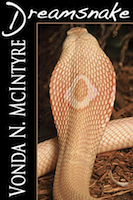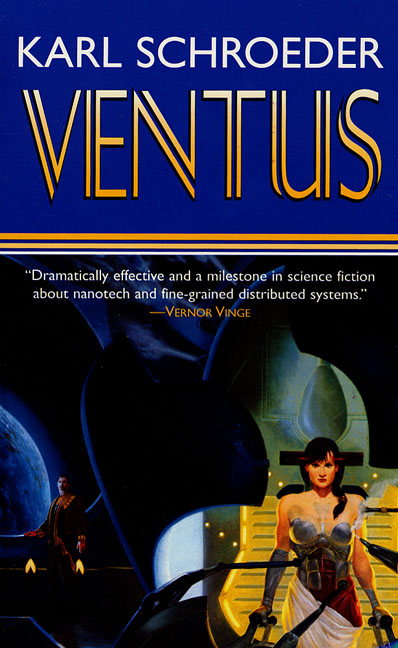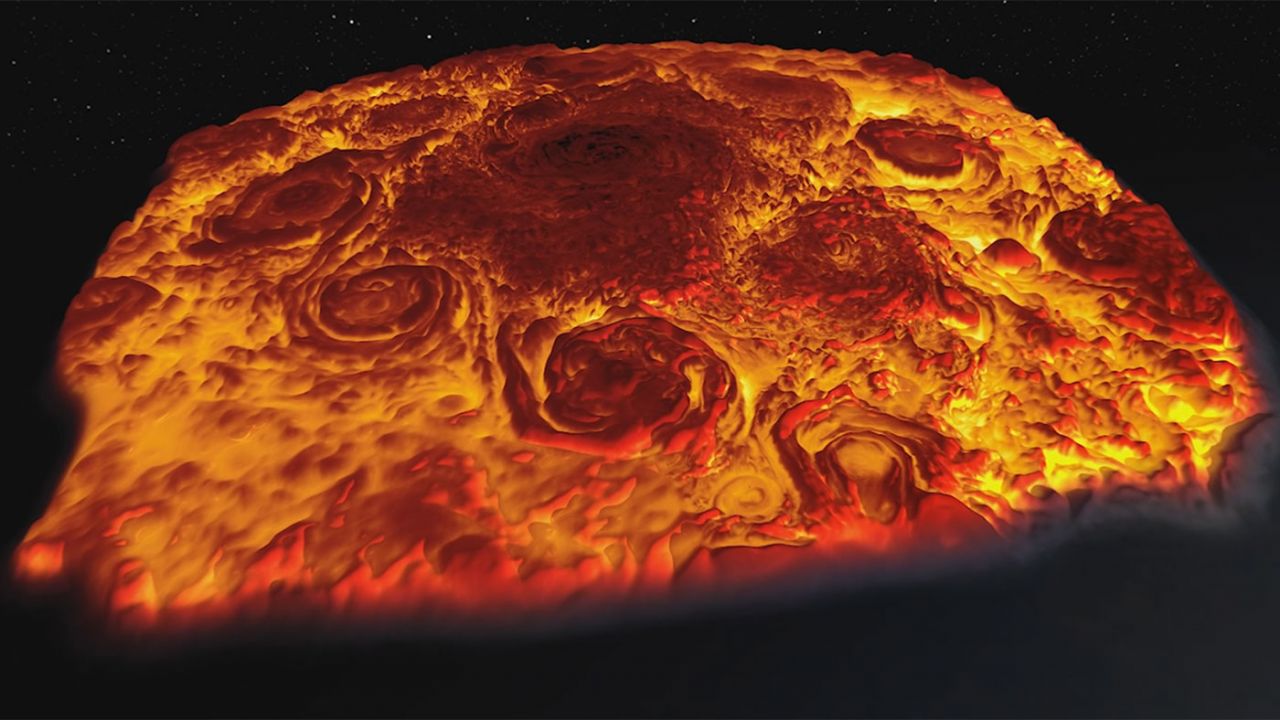Chain Mail is a telephone tag by email round-robin interview session with authors from the Book View Cafe writers collective. Images are links, connecting to biographical information about an author or more information on their current work. Additional information can be found on the contributors page.
Amazing Stories: Margaret Atwood stated that she wrote speculative fiction, as opposed to science fiction which she characterized as “talking squids in outer space”*: what was your reaction upon learning of Atwood’s statement? Has your response to it changed now that Ms. Atwood seems to be backpedaling a bit?
(*For a bit more in-depth look at Atwood’s reasoning, this response to Ursula Le Guins’ then recent review of The Year of the Flood may help.)
Vonda N. McIntyre
As one of the few SF writers to include a character who is in fact a talking squid in outer space (Nemo in Starfarers), I decided it would be fun to take the tentacle and run with it: www.talkingsquidsinouterspace.com
And it has been fun, particularly putting together the Natural History section. Cephalopods (octopus, squid, cuttlefish, nautilus) are fascinating creatures. The real-life natural history is in a lot of ways more interesting than the imagined science-fictional talking squids.
For example, I don’t believe any SF writer has presented a squidly character who talked out of both sides of its mouth, the way a cuttlefish might say different things on either side of its body. (“Come to me, my little cuttlefish, I am a strong and gentle lover” on one side, and on the other “Get your squidlips out of here, competing male cuttlefish, I am big and strong and this lady cuttlefish is mine mine mine.”)
I’m sure that Margaret Atwood has never read a word I’ve written; most literary writers who venture into SF don’t read much SF. She’s entitled to say her work isn’t SF, or it is spec fic, or to make up her own definition of SF, speculative fiction, or skiffy, even if her definitions don’t agree with anybody else’s. (Arguing over definitions of SF is a good old fashioned parlor game among SF readers, writers, and critics.)
I’m entitled to say that SF is the equal of any other branch of literature, realistic fiction included, and that civilizations built on speculation about cephalopods, anarchists, or aerogels are a lot of fun to imagine, invent, and write about.
Judith Tarr
I always thought “speculative fiction” was science fiction.
Also that the term was around long before Ms. Atwood laid claim to it.
Shows you what I know.
Vonda illustrates beautifully the difference I’ve observed between literary writers “speculating” and science-fiction writers science-fictionizing. It actually reminds me of the way some rather prominent science-fiction writers have described fantasy as “dead easy, just make stuff up, as opposed to Our Very Careful Scientific Worldbuilding.”
Except, you know, fantasy writers mostly don’t. But literary writers, that I have observed, mostly do.
Not that I have any problem with that. Sometimes when you reinvent the wheel, the result just might be a working warp drive. But you don’t get to claim there was no such thing as a wheel before you reinvented it, or if there had been, that it was an inferior object and anyway you prefer to call it something else. Which you didn’t invent, either.
People could just write what they write and let the labels fall where they may.
 Dave Trowbridge
Dave Trowbridge
My reaction was irritation at the too-familiar literary posturing, and then a brief surge of pity for a writer unable to accept heartfelt compliments on her work. I’m glad she’s apparently becoming more comfortable with the idea that some of her work might be considered a form of science fiction.
Perhaps one day she’ll get over her reluctance to write books that “have things in them that we can’t do yet” and stretch her art even farther.
 Sue Lange
Sue Lange
I’m with Judy on this, I don’t believe she invented the term. I don’t think she said she invented the term, either.
I believe she was trying to classify her work for an audience that, as Vonda stated, loves to fight about classification. I think that what she’s trying to say is that although she wrote futuristic work, it was more allegorical in nature than straight ahead science fiction which does not apologize for itself the way allegorical fiction does.
Would George Orwell consider his work science fiction? Probably not, but we as sf fans embrace the work anyway. He wrote what he wrote because he was using allegorical characters and situations to illustrate a point. Just because we as science fiction fans love the sf elements doesn’t mean he would embrace the entire genre and say, “yes, that’s what I’m writing.” I think he would say he’s writing anti-communistic pr before he’d admit it was science fiction.
Of course, that’s just speculation. Like Atwood’s fiction.
 Maya Kaathryn Bohnhoff
Maya Kaathryn Bohnhoff
To me, that characterization is no more valid than Lee Mortimer’s snark about SF being the escapist genre that “takes the reader to strange new worlds and neglects to bring him home again” (or words to that effect).
Writers (and politicians) are famous for making bald (and sometimes snooty) pronouncements about things then having to backpedal. I recall Rita Mae Brown saying that using a word processor was cheating and encouraged sloppy editing because it did all the work of writing and made it too easy to cut and paste. This, from a woman who writes novels with her cat. (I’m smiling as a write this.)
We all write speculative fiction. And those of us who write stuff that is stuff to categorize as strictly SF or fantasy can all back up to that higher level container which, to me, is all the “speculative fiction” label is.
I mean really, in a sense, isn’t all fiction speculative? Whether it happens in space among talking squids or in a castle inNottingham, isn’t it all asking “what if…?”
 Brenda Clough
Brenda Clough
All fiction is fantasy fiction. Even that very small subgenre of ‘true history’ fiction (in which Teddy Roosevelt or Emma Goldman comes onto the page with their historical words in their mouths) is fantasy. You were not there when Lincoln gave his Gettysburg Address, were you? So you must be fictionalizing it to a greater or lesser extent if it appears on your page.
And under that huge fantasy fiction umbrella, we have our smaller tents: literary, mystery, science, romance.
In other words, Margaret Atwood is not condescending to join us. She has noticed that she is under the umbrella with us. She has been, all this time. Wake up and smell the coffee, honey!
 Deborah J. Ross
Deborah J. Ross
I’m a bit wearied by the expostulations of people who haven’t read science fiction because they know ahead of time they won’t like it, it’s trivial and self-indulgent, and therefore their (near-future/dystopic/etc.) work can’t possibly be science fiction. So they run around finding new labels for it. “Speculative fiction” as a term has been around at least since 1889 (Lippincott’s Monthly Mag. Oct. № 597: “Edward Bellamy, in LOOKING BACKWARD, and George Parsons Lathrop, in a short story, THE NEW POVERTY, have followed the example of Anthony Trollope and Bulwer in speculative fiction put in the future tense.”) Certainly, it was widely enough accepted in the science fiction community for Heinlein (1947), L. Sprague de Camp (1953), and Samuel R. Delaney (1969) to have used it. But this is neither here nor there, except to demonstrate that Atwood has, perhaps unintentionally, appropriated a term used by science fiction writers to describe their own work.
Underlying the attitude of “My work is serious literature, therefore it can’t be science fiction” are the assumptions that science fiction is either based on ignorance of human nature or it’s carelessly written, to abysmal literary standards, that science fiction writers are so enamored of gadgets or weird aliens that they don’t do their research or consider the social (etc.) implications of their concepts, and that they are uneducated about the larger field of literature. I find this small-minded and sad-minded, but I don’t suppose anything I (who featured a race of intelligent, star-travelling gastropods in my first published novel) can say will change their minds.
In the end, it’s their loss, while we continue to celebrate the creativity, insight, and excellence of our field
 Katharine Eliska Kimbriel
Katharine Eliska Kimbriel

And fascinating, intelligent, star-traveling gastropods they were, Deborah! As my esteemed colleagues have already said, speculative fiction is science fiction, and the term has been used for avery long time. When I started out, I tended to refer to my novel as speculative fiction, because I didn’t have people being blasted out of orbit every other minute. (That was another, unpublishedversion of the book.) I’m a big believer that SF is about “What If?” and “Wow!” Every speculative fiction novel should have at least one of those things in it – preferably both. I felt that it was sad Atwood couldn’t accept the fact that a new group of readers had discovered her, and might seek out other books she’d written. She’s not the only literary writer to dip her toe into speculative fiction. How ironic that there’s a chance the book she will be remembered for is her speculative fiction novel.
The best story I can contribute on the topic of what-do-we-call-it comes from the late Warren Norwood. He liked to throw a verbal bomb into a panel by stating, “Science fiction is fantasy.” As people would inhale and prepare for lively discussion, he would add: “Arthur C. Clarke’s The Nine Billion Names of God.” And the audience would go
“Well….”
Every fiction author, if they’re honest, writes speculative fiction. The question is, what parameters do they set on theirvision and imagination before they start writing. Do they set their imagination free, that first draft, and see what bubbles up? Who knows, it might be champagne. That’s what I’d ask Ms. Atwood, if we had a chance to discuss the topic.
 Phyllis Irene Radford
Phyllis Irene Radford
What the others said, better than I could.
Pati Nagle, Linda Nagata, Jennifer Stevenson and Chris Dolley passed on this question.












